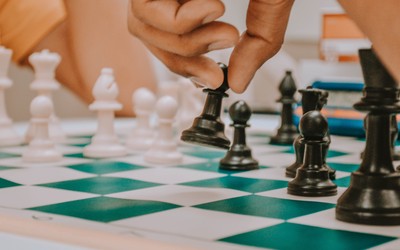
Photo by Jonathan Petersson on Unsplash
There is definitely luck in chess
Sometimes you play well. Sometimes you're lucky.“There is no luck in chess.” You hear that a lot in chess social media. It’s one of those statements that just has the ring of truth. Isn’t everything there on the board for everyone to see? Where’s the luck?
In a game theory sense, chess is a game with perfect information. Both players know the full, current state of the game. There is nothing hidden. Everything is on the board. Contrast that with a game like poker, which has imperfect information. You don’t know what the other person is holding.
Chess may be a game of perfect information, but it's not a game of complete information. A game with complete information is one where you know not only the current state of the board, but also exactly how your opponent will play. In practical terms, everyone at every step knows what moves are possible and the outcome of the game if they are played.
I think tic-tac-toe is a good example of a game with perfect and complete information. It is perfect in that both you and your opponent know everything about the current state of the game. It is complete in that there is a strategy that both sides can follow that ensures that every possible game is a draw. (If you’re interested in using that strategy to beat friends and family, since both sides need to know the strategy to guarantee a draw, it’s described in the Wikipedia article linked above.)
Chess is a game of perfect and incomplete information. The Wikipedia article on complete information has this to say about chess: “One can readily observe all of the opponent's moves and viable strategies available to them but never ascertain which one the opponent is following until this might prove disastrous for one. Games with perfect information generally require one player to outwit the other by making them misinterpret one's decisions.”
Where’s the luck in chess? Everywhere. Did you see a mating pattern that your opponent didn't? Did you stay out too late the night before and were more focused on feeling bad than on the board? Did you forget the move order of a recently popular line in the Benoni and it turned out that the wrong move order is just losing? Did you randomly look at this exact opening line just an hour before your game and managed to get a huge advantage over your much higher rated opponent? Did you just lose all four of your daily training games in a row for the first time? Are you three hours into a positional grind and you moved your king to the wrong square because of fatigue? Did you make a brilliant queen sacrifice only to find out that your opponent could actually counter it? Oh no, my queen, indeed.
Willy Hendriks looks at chance in chess in a chapter of his book, Move First, Think Later. He compares the distribution of tournament results to rolling dice. If you play dice against someone else—highest roll of two dice wins—you'll win some games and lose others. Overall excluding draws and assuming fair dice, you'd expect to win exactly 50% of the time, but that's only true over a very large number of games. If you played someone 10 times, you might come out on top, or they might. The variation will be small. Most series of games will end in a draw. There's a very small chance that you'll win all 10 games. More likely—if someone wins—they'll win with 6. Willy shows that the same distribution can often be seen in tournament results where players have scores that are 1 more or 1 less than their expected performance given their rating and the ratings of their opponents.
From a game theory point of view, incomplete information in chess means that you don’t know the strategy of your opponent. That lack of understanding is true even for chess engines. The number of possible positions that need to be looked at is just too large, so chess engines have to choose what they look at and two engines may not choose to look at the same subsets of positions. Even if everything else is equal—move depth considered, time taken, hardware used,—one engine is going to choose better and win more.
If “luck” applies to engines, why wouldn't it also apply to you? In fact, I would say it does. As I learned when I looked at how we play and learn chess, you understand a certain set of patterns and you can't see on the board what you don't understand. I'd say that most games are decided on the difference between your understanding of patterns and your opponent's. It's the reason that you may sometimes play like a master and other times like a novice. It's also the reason why super GM games are often draws because the differences in understanding between players at that level is miniscule.
The one thing I hate about the (false) assertion that “there’s no luck in chess” is that it puts all the responsibility for a loss on the loser and all the credit for a win on the winner. But who hasn’t looked at the engine analysis for a game they won and found a surprise, like their opponent had a mate in 1? Sometimes you play well; sometimes you're lucky. Sometimes you play poorly; sometimes you're unlucky.
Don’t be too hard on yourself if you have a run of bad luck. If you have a run of good luck, celebrate, but also be thankful. Remember, it’s possible to score 45.5 in 46 games. If you play a huge number of games, it’s even likely. In any case, there's definitely luck involved.
Photo by Jonathan Petersson on Unsplash




